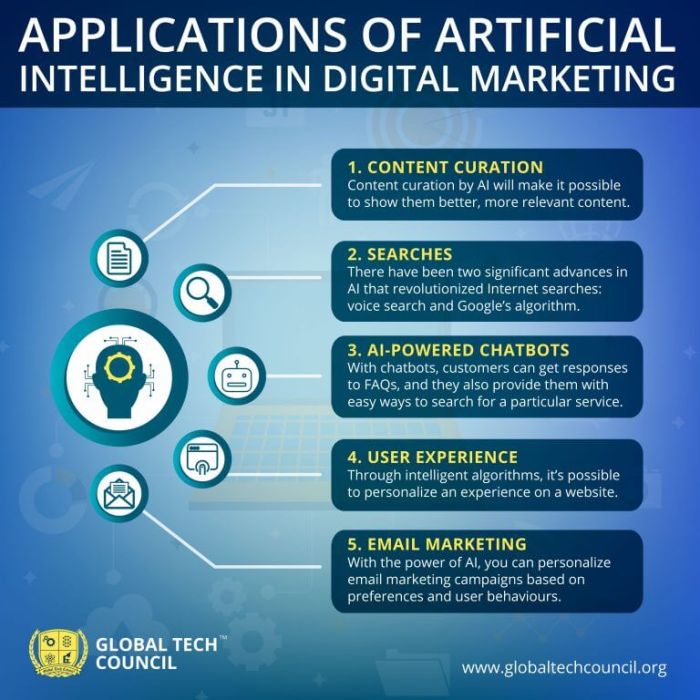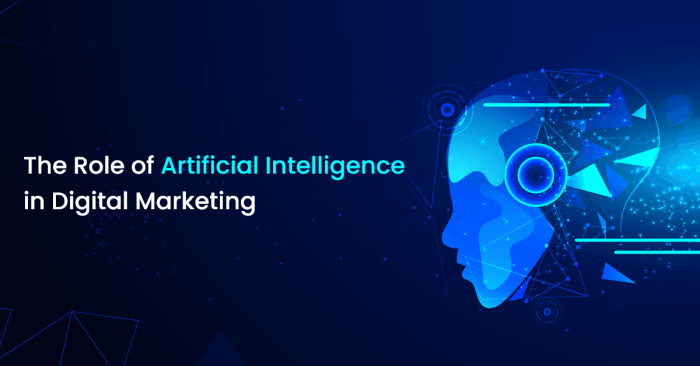The role of artificial intelligence (AI) in digital marketing is rapidly evolving, transforming how businesses connect with their audiences. From hyper-personalized campaigns to predictive analytics that optimize strategies, AI is no longer a futuristic concept but a powerful tool reshaping the marketing landscape. This exploration delves into the multifaceted ways AI enhances efficiency, improves customer experiences, and ultimately drives better results.
We’ll uncover how AI empowers marketers to understand their customers more deeply, create more engaging content, and achieve a greater return on investment.
This journey will cover AI’s impact on personalization, content creation, predictive analytics, customer service, and the crucial ethical considerations involved in its responsible implementation. We will examine real-world examples, practical applications, and future trends, offering a comprehensive understanding of AI’s transformative potential in the digital marketing world.
AI-Powered Personalization in Digital Marketing

AI is revolutionizing digital marketing, enabling marketers to move beyond generic campaigns and deliver highly targeted, personalized experiences that resonate deeply with individual customers. This level of personalization fosters stronger customer relationships, increases engagement, and ultimately drives significant improvements in key marketing metrics. The power of AI lies in its ability to analyze vast amounts of data to understand customer behavior and preferences, allowing for the creation of tailored marketing strategies that are both effective and efficient.
AI algorithms analyze user data from various sources, including website activity, purchase history, social media interactions, and email engagement. This data is processed to identify patterns, preferences, and behaviors, creating detailed customer profiles. These profiles are then used to tailor marketing messages, offers, and content, ensuring that each customer receives a unique and relevant experience. The algorithms constantly learn and adapt, refining their understanding of customer behavior over time and optimizing the personalization strategies accordingly.
This iterative process ensures that the personalization efforts remain effective and relevant in a constantly evolving digital landscape.
AI-Driven Personalization Techniques
AI-driven personalization employs a range of techniques to create tailored marketing experiences. These techniques are applied across various digital marketing channels, including email marketing, website content, and ad targeting. The selection of techniques often depends on the specific goals of the campaign and the available data.
In email marketing, AI can personalize subject lines, email content, and even the timing of email delivery based on individual customer preferences and behavior. For example, an AI system might send a promotional email about a new product only to customers who have previously shown interest in similar products. On websites, AI can personalize the content displayed to each user, recommending products or articles based on their browsing history and past purchases.
Dynamically changing website elements such as images, calls-to-action, and product recommendations based on user preferences are also common practices. In ad targeting, AI algorithms analyze user data to identify the most relevant audiences for specific advertising campaigns, ensuring that ads are shown only to users who are most likely to be interested. This precise targeting improves ad performance and reduces wasted ad spend.
Benefits and Challenges of AI-Powered Personalization
Implementing AI-powered personalization strategies offers significant benefits, but also presents certain challenges. Understanding both sides is crucial for successful implementation.
The benefits include increased customer engagement and conversion rates, improved customer satisfaction and loyalty, enhanced brand reputation, and optimized marketing ROI. However, challenges include the need for high-quality data, the complexity of implementing AI systems, concerns about data privacy and security, and the potential for biases in AI algorithms. Careful consideration and planning are essential to overcome these challenges and maximize the benefits of AI-powered personalization.
Examples of Successful AI-Driven Personalization Campaigns
Several companies across various industries have successfully leveraged AI-powered personalization to achieve remarkable results. The following table highlights some notable examples:
| Industry | Company | Technique | Results |
|---|---|---|---|
| E-commerce | Amazon | Product recommendations based on browsing and purchase history | Significant increase in sales and customer engagement |
| Travel | Expedia | Personalized travel recommendations based on user preferences and past trips | Improved booking conversion rates and customer satisfaction |
| Retail | Netflix | Personalized movie and TV show recommendations based on viewing history | Increased viewing time and subscriber retention |
| Financial Services | Bank of America | Personalized financial advice and product recommendations based on customer financial profiles | Improved customer engagement and increased adoption of financial products |
AI’s Role in Content Creation and Optimization: The Role Of Artificial Intelligence (AI) In Digital Marketing

The rise of artificial intelligence is revolutionizing digital marketing, offering unprecedented opportunities to streamline workflows and amplify impact. AI’s capacity to generate and optimize content is particularly transformative, allowing marketers to create more engaging materials, reach wider audiences, and achieve better results with increased efficiency. This section explores the multifaceted role of AI in content creation and optimization, examining its capabilities, limitations, and practical applications.AI tools are rapidly becoming indispensable assets for marketers across various content formats.
These tools leverage natural language processing (NLP) and machine learning (ML) to generate diverse marketing materials, significantly reducing the time and effort required for content production.
AI-Powered Content Generation
AI can generate various types of marketing content, including blog posts, social media updates, ad copy, and even email newsletters. Tools like Jasper, Copy.ai, and Writesonic utilize advanced algorithms to produce text based on provided prompts and parameters. For example, a marketer could input s and a desired tone to generate several variations of ad copy for A/B testing.
Similarly, an Artikel for a blog post can be used to generate a complete draft, saving hours of writing time. The generated content often requires human review and editing to ensure accuracy, brand consistency, and overall quality, but it significantly accelerates the content creation process.
AI-Driven Content Optimization, The role of artificial intelligence (AI) in digital marketing
Beyond content generation, AI plays a vital role in optimizing content for better performance. AI-powered tools analyze search trends, performance, and competitor strategies to identify opportunities for improvement. These tools suggest relevant s, optimize meta descriptions, and even identify areas within existing content that require revision to improve search engine ranking. Furthermore, AI can analyze user engagement metrics such as click-through rates, time on page, and bounce rates to understand what resonates with the audience and refine content accordingly.
This data-driven approach allows marketers to continuously improve their content strategy and maximize its effectiveness.
Comparing AI-Generated and Human-Created Content
AI-generated content excels at speed and scale, enabling the rapid production of large volumes of content. It can also analyze vast amounts of data to identify patterns and trends that humans might miss, leading to more targeted and effective content. However, human-created content often possesses a greater depth of creativity, emotional intelligence, and nuanced understanding of the target audience.
While AI can generate grammatically correct and contextually relevant text, it may lack the originality, wit, and persuasive power of human writers, especially in complex or emotionally charged topics. The ideal approach often involves a collaborative model, leveraging AI’s efficiency for initial drafts and human expertise for refinement and enhancement.
Hypothetical Marketing Content Calendar for a New Fitness App
Let’s imagine a new fitness app called “FitFlow.” We can leverage AI tools to create a comprehensive marketing content calendar:
| Week | AI Task | Expected Output |
|---|---|---|
| 1 | Generate social media posts highlighting app features (using Copy.ai) | Series of engaging tweets, Instagram captions, and Facebook posts showcasing FitFlow’s unique selling points. |
| 2 | Create blog post about the benefits of regular exercise (using Jasper) | Informative and engaging blog post optimized for relevant s, driving organic traffic to the app’s website. |
| 3 | Generate ad copy for targeted Facebook and Instagram campaigns (using Writesonic) | Multiple versions of ad copy optimized for different demographics and interests, enabling A/B testing for maximum conversion. |
| 4 | Analyze website traffic and user engagement data to optimize content (using Google Analytics and AI-powered tools) | Insights into user behavior, allowing for content adjustments to improve user experience and app downloads. |
This calendar demonstrates how AI can streamline the content creation and optimization process, allowing for a more efficient and effective marketing strategy.
In conclusion, the integration of artificial intelligence into digital marketing strategies presents an unprecedented opportunity for growth and innovation. By harnessing the power of AI responsibly and ethically, businesses can unlock deeper customer insights, create more compelling experiences, and achieve remarkable results. The future of marketing is intelligent, personalized, and data-driven – a future powered by the transformative potential of AI.
Embracing this technology while prioritizing ethical considerations will be key to success in the ever-evolving digital landscape.
Browse the implementation of how to attract and retain top talent in the digital marketing field in real-world situations to understand its applications.
Examine how overcoming common challenges in the digital marketing industry can boost performance in your area.